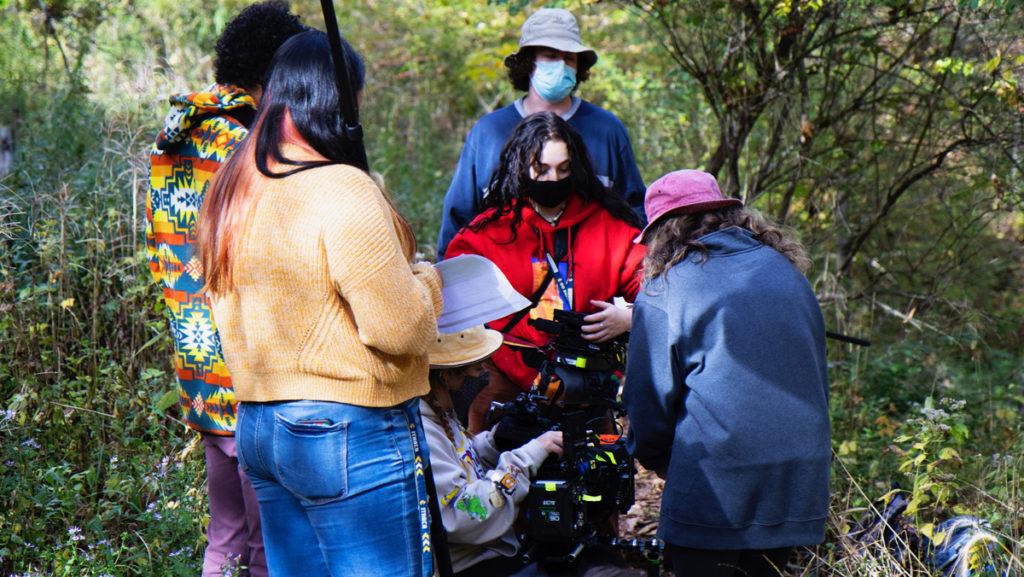When classes went online in March because of the COVID-19 pandemic, Ithaca College senior Devin Balloqui-Smith went from making films in Ithaca with professional equipment, actors and fellow filmmakers to being quarantined at home with nothing to work with but his phone and his thoughts.
But Balloqui-Smith said that he adjusted quickly, working on two films for his classes throughout the remainder of the spring semester. The first short film depicted a love story between Balloqui-Smith and a body pillow. The second was about a workout session that quickly turned into a song, with the trainees transforming into instruments. Both were shot on his phone.
“I didn’t want to take it too seriously,” he said. “It’s obviously not the experience we wanted, but it’s what we got, so might as well make kind of a joke out of it.”
Balloqui-Smith said the adjustment also proved to be a great learning experience.
“Filmmaking is a series of problems, and you have to figure out how to solve those problems, so this is kind of just another problem,” Balloqui-Smith said. “While this is not ideal or really fun for anyone, it is an unexpected challenge, which is almost a good change of pace.”
This semester, Balloqui-Smith is working on a film for his senior thesis class called “Red Herring.” The story follows two former best friends who reunite to go on a treasure hunt. He said that his team wrote the film prior to restrictions for film sets being released as a result of the pandemic, and the script requires only two actors and a limited crew. He said he feels fortunate to have written a script that allows for a smaller group because other teams needed to rewrite scripts to adapt to the new safety precautions.
Senior Jackson Gallati, a cinema and photography major, said that being at home last semester forced him to rethink his production plans.
“We had just spent the first half of the [spring] semester putting together this one idea,” he said. “Suddenly, it’s all out the window, and you don’t have any camera from the school. You don’t have any equipment from the school. You don’t have any crew. You don’t have any cast, so right away you just start asking yourself, ‘Well, what kind of movies can I make?’”
Like Balloqui-Smith, Gallati had no professional equipment at home. He said that his film for class last semester was about him and his brothers reuniting during quarantine. Gallati said that instead of shooting a new film on his phone, for example, he compiled footage from the 2001 GameCube game, “Super Smash Bros. Melee” to re–create nostalgic themes.
For his senior thesis class, Gallati and his fellow classmates were required to submit a safety proposal outlining what precautions they will take to keep everyone on set healthy. He said it has been encouraging to see the college’s support for film students by allowing rentals from Park Portable Equipment Center and Services (PPECS) for students living in or near Ithaca. PPECS will be taking reservations for equipment placed at least 72 hours in advance.
Gallati said that film is dependent on collaboration, but because of social distancing regulations, there were fewer opportunities for that to occur.
“I was very aware that I was alone the entire time, where usually I like operating at a team level where everyone’s contributing,” Gallati said.
During the spring semester, junior Joe Berardi and senior Angela Martino — both cinema and photography majors — continued to work on projects they filmed prior to classes shifting online. The team finished filming in Ithaca during the last week of February, right before leaving the college for a spring break that turned into a monthslong quarantine.
Berardi and Martino collaborated on “Mother’s Flowers,” a film about three sisters deciding what to do with their family farm after their mother dies of a plague. They wrote the script pre-pandemic, but Martino and Berardi said that the nature of the topic became more timely than they thought while writing it.
Although they had shot the footage for the project, there were still logistical challenges to face. The production team had to coordinate how to communicate via Zoom and transfer the file with the video footage while editing in different states.
“It was a huge learning curve understanding where different pieces had to go and how to make the best of the current situation while being safe,” Martino said.
Hollywood filmmakers have also needed to adapt — or simply shut down production — during the pandemic. Filming in large groups or public locations is not as commonplace as it once was, and films in the next few years may have fewer characters with smaller crews.
Anthony Carbone ’98 is a showrunner and executive producer for “Tough As Nails,” a reality competition show on CBS. Carbone is also an executive producer for the Netflix game show “Floor Is Lava” in which contestants have to complete an obstacle course without falling onto the floor.
Carbone said that the pandemic has changed what sets look like today. In preparation for filming season two of “Floor Is Lava,” he said he and his team created a detailed safety plan that includes implementing a pod system in which only six to 10 people work together. He also said the crew uses proximity badges that beep if they get within six feet of another person. The badges retain the history of when and why someone buzzed, a feature that helps with contact tracing.
Carbone said he thinks the way people consume film and television is shifting as well.
“At what point will people feel comfortable in a large enough group to go to theaters?” Carbone said. “The answer to that is, ‘Who knows?’ Because we have so much content at home, and we have other distractions, it’s not a loss to many people right now.”
With studios postponing major releases like the new James Bond “No Time to Die” and sci-fi “Dune” films to 2021, there is no major influx of moviegoers, who are now more wary of the health risk of theaters. The delay of these films has caused the closure of Regal Cinemas, the second–largest theater chain in the United States.
Idrissou Mora-Kpai, assistant professor in the Department of Media Arts, Sciences and Studies, said this industry slowdown decreases the number of jobs for actors, producers and directors, as well as jobs related to film festivals. The 2020 Cannes Film Festival, scheduled for May 12–23, was postponed in March before being canceled.
“You can imagine how many people move to Cannes for two weeks of a film festival, and … the economics of the city play a big role,” Mora-Kpai said. “This year, there was no Cannes, so hotels, restaurants and so many businesses have to close this year. Imagine, worldwide, how many people are affected by what is happening right now.”
Gallati said that these changes to the film industry are worrisome for him because he will be entering the workforce next year. He said he thinks the economic hit the industry took will make companies more hesitant to hire recent graduates. Over the next five years, the theatrical industry is estimated to lose $24.4 billion as a result of the pandemic.
Berardi said that he and Martino have outsourced an animator for their film project this year as a way to adapt. He said the pandemic has changed what films can look like, both at the college and within the film industry as a whole. The story follows a six-year-old girl who tries to send a message to her father working at the International Space Station.
“I just think it shows that there are so many unconventional ways to shoot film and to make cinema, that it doesn’t have to be in a studio,” Berardi said. “You don’t need a cast and crew of 500 people. You can make a great story independently.”















